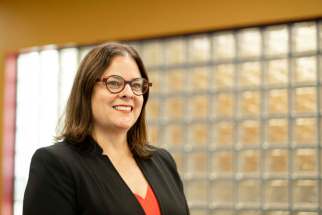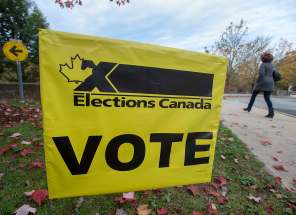Our home and apathetic land Four in 10 eligible voters didn't bother to cast a ballot in Monday's election; many Canadians are disillusioned with the process, the parties, the broken promises
Read this article for free:
or
Already have an account? Log in here »
To continue reading, please subscribe:
Monthly Digital Subscription
$0 for the first 4 weeks*
- Enjoy unlimited reading on winnipegfreepress.com
- Read the E-Edition, our digital replica newspaper
- Access News Break, our award-winning app
- Play interactive puzzles
*No charge for 4 weeks then price increases to the regular rate of $19.00 plus GST every four weeks. Offer available to new and qualified returning subscribers only. Cancel any time.
Monthly Digital Subscription
$4.75/week*
- Enjoy unlimited reading on winnipegfreepress.com
- Read the E-Edition, our digital replica newspaper
- Access News Break, our award-winning app
- Play interactive puzzles
*Billed as $19 plus GST every four weeks. Cancel any time.
To continue reading, please subscribe:
Add Free Press access to your Brandon Sun subscription for only an additional
$1 for the first 4 weeks*
*Your next subscription payment will increase by $1.00 and you will be charged $16.99 plus GST for four weeks. After four weeks, your payment will increase to $23.99 plus GST every four weeks.
Read unlimited articles for free today:
or
Already have an account? Log in here »
Hey there, time traveller!
This article was published 24/09/2021 (1542 days ago), so information in it may no longer be current.
As a girl, I learned about voting by watching my father fill out an absentee ballot mailed from the Iowa county he’d pulled up our family’s American roots from two decades before. We sat cross-legged on the living-room floor, hands tracing lists of candidates, not only for president, but also for sheriff and coroner and judges.
My father, who had long purged the internalized shame of having once participated in a Richard Nixon club in high school, was proud of the fact he had never voted for a Republican; he showed me the box he checked to pledge a straight Democrat ticket. And he talked about voting, and about democracy, and about politics.
“The thing about a president,” he explained, “is that it’s not like a king. Anyone can become president.”
…I know how I vote: reluctantly, sometimes a little resentfully, in protest or fatigue, or just disappointment. It’s a sense of obligation that drives me to the polls more than any sense of meaning.
My eyes widened. “Are you going to run for president?”
He laughed and shook his head. Still, for many years I imagined a ballot with my father’s name at the top; already, I was transfixed. Explained to me this way, the act of democracy seemed so close. I could touch it and hold it, feeling in the ballot something of the sacred, eager to grow up and undertake the same rite of passage.
Maybe that memory is why, since turning 18, I have voted in every election for which I am eligible.
There is some debate on whether journalists should vote, the idea being that by casting a ballot you are, in some way, attaching yourself to a desired outcome. I know some who don’t, and some who do proudly, believing — also with merit — that journalists should at least aim to represent the best ideals of civic engagement.
Me, I vote. Partly, it’s that I cover politics as little as I can plausibly manage, having realized long ago that it’s a sport I’m not fit to play. Mostly, it’s that I know how I vote: reluctantly, sometimes a little resentfully, in protest or fatigue, or just disappointment. It’s a sense of obligation that drives me to the polls more than any sense of meaning.
I vote because I was once a little girl sitting on the floor with her dad, finding in the act a certain sort of magic. It’s not there for me anymore or, at least, not in the ballot. The process, the poll workers, the fact that we have access to the vote in safety — all of that leaves me misty-eyed thankful. But when marking the X, I mostly feel numb.
Still, I am told there are Canadians — people who aren’t members of any of the parties, I mean — who are excited to vote, excited about the candidates, excited about who they hope to be the next prime minister. I am told they exist, but I’m not sure I’ve ever met them; the friends I talk to about voting sound a lot more like me.
“Did you vote?” one of us might ask, and then comes the rest: a sigh, a shrug, a few words of resignation. “Figured I may as well,” perhaps. Or, “Yeah, I just can’t stand the idea of so-and-so winning” or, “The candidate I voted for won’t win, but at least I can sleep at night,” which is a particularly depressing summary of the status quo.
What I am certain of is that this malaise is not confined to my friends. Forty per cent of eligible voters did not cast a ballot in Monday’s federal election, making Canadians’ most broadly popular choice to be “none.” Since the 1960s, turnout in Canada has taken a jagged path of overall decline; this year’s is the second-lowest on record.
Forty per cent of eligible voters did not cast a ballot in Monday’s federal election, making Canadians’ most broadly popular choice to be “none.”
There are many reasons people don’t cast a ballot. Not all are related to ambivalence. The pandemic likely played a role this year, and there are still barriers that we must aim to reduce. Three northwestern Ontario First Nations didn’t even get election-day polling stations, and voting card mix-ups directed residents hundreds of kilometres away.
Then there is the fact that, this year, there was likely a higher-than-normal level of frustration at the fact the election was called at all. It was a nakedly strategic bid by the Liberals, which is to be expected from a minority government, but rankled in the midst of a pandemic; Canadians were clearly unimpressed by the fact it happened.
But overall, the largest factor in Canadian turnout is apathy. Plain and simple. This is not the fault of the apathetic; it’s the fault of a political climate in which many people, not without merit, feel that voting doesn’t produce a material change to their conditions. Why vote, if no one asking for yours earns neither your hope or your trust?
After Monday’s election, Canadian political commentary captured some of this feeling; Humber College professor (and former Winnipegger) Tyler Shipley called it a “passive boycott of the electoral circus.” This disconnection is a looming crisis in Canadian politics, and neither the system or culture suggests an easy answer.
Will electoral reform help, to make results more proportional to votes? Are there changes that could be made within parties to encourage more inspirational leaders? Then again, maybe that won’t help. For the last two elections, NDP Leader Jagmeet Singh has polled as the most likable leader; in neither did it mean much at the ballot box.
It’s best I leave the finer points of the debate to the experts. What I do know is this: if we want to claim a democracy that works for its people, then we must aspire to one where more Canadians feel an investment in the process, and where voters can imagine potentials more inspiring than affirming one or another colour of status quo.
One final note. Over the years, I’ve heard many people repeat the maxim that if you don’t vote, then you forfeit your right to complain about the outcome. With respect, I do not agree. Elected officials are bound to represent all of their constituents, not only those who voted for them, and not only those who voted.
Or, to put it simply: if someone claims to speak for you, you have every right to criticize what they do and say.
It’s a resounding statement that our politics, from the campaigns through to the governance, is failing to convince too many Canadians that their voice and their needs actually matter.
And when 40 per cent of eligible Canadians choose to stay home, that is a criticism spoken in unison in the loudest possible way. It’s a resounding statement that our politics, from the campaigns through to the governance, is failing to convince too many Canadians that their voice and their needs actually matter.
Once, I was a little girl for whom the act of voting made politics feel so close, it was as if I could touch it. And maybe the actual grind of it all can never recapture that magic. Still, one can dream of a Canada in which voters are lifted to the polls on a sense of empowerment, and few turn away for feeling disillusioned.
melissa.martin@freepress.mb.ca
Our newsroom depends on a growing audience of readers to power our journalism. If you are not a paid reader, please consider becoming a subscriber.
Our newsroom depends on its audience of readers to power our journalism. Thank you for your support.







